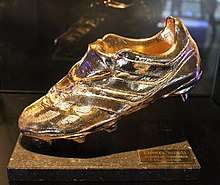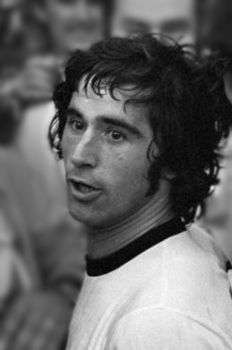European Golden Shoe
The European Golden Shoe, also known as European Golden Boot, is an award that is presented each season to the leading goalscorer in league matches from the top division of every European national league. The trophy is a sculpture of a football boot. From its inception in the 1967–68 season, the award, originally called Soulier d'Or, which translates from French as Golden Shoe or Boot, has been given to the top goalscorer in all European leagues during a season, with a weighting in favour of the highest ranked leagues. Originally presented by L'Équipe magazine, it has been awarded by the European Sports Media since the 1996–97 season.
| European Golden Shoe | |
|---|---|
 Lionel Messi's 2012–13 Golden Shoe | |
| Awarded for | Leading goalscorer from the top division of every European national league |
| Presented by | L'Équipe (1968–1991) European Sports Media (1997–Present) |
| First awarded | 1968 (awarded for most goals scored in the 1967–68 season) |
| Currently held by | |
| Most awards | |
| Website | eusm.eu |
History
Between 1968 and 1991, the award was given to the highest goalscorer in any European league. This was regardless of the strength of the league in which the top scorer played and the number of games in which the player had taken part. During this period Eusébio, Gerd Müller, Dudu Georgescu and Fernando Gomes each won the Golden Shoe twice.[1]
Following a protest from the Cyprus FA, which claimed that a Cypriot player with 40 goals should have received the award (though the official top scorers for the season are both listed with 19 goals), L'Équipe issued no awards between 1991 and 1996.
Since the 1996–97 season, European Sports Media have awarded the Golden Shoe based on a points system that allows players in tougher leagues to win even if they score fewer goals than a player in a weaker league. The weightings are determined by the league's ranking on the UEFA coefficients, which in turn depend on the results of each league's clubs in European competition over the previous five seasons. Goals scored in the top five leagues according to the UEFA coefficients list are multiplied by a factor of two, goals scored in the leagues ranked six to 21 are multiplied by a factor of 1.5, and goals scored in leagues ranked 22 and below are multiplied by a factor of 1.[2] Thus, goals scored in higher ranked leagues will count for more than those scored in weaker leagues.[3] Since this change, there have only been two winners who were not playing in one of the top five leagues (Henrik Larsson, 2000–01 Scottish Premier League and Mario Jardel, 1998–99 Primeira Divisão and 2001–02 Primeira Liga).
Although the Golden Shoe could be shared among multiple players in the past, in the 2019–20 season this rule was changed to give the award to the player with the least minutes played, should there be a tie on points.[4]
Winners
.jpg)


| Denotes the number of times the player had won the award at that time | |
| Denotes player's team won league that season |
- Notes
- Original 1986–87 season winner Rodion Cămătaru (with 44 goals) was disqualified later and the trophy was awarded to Polster in 1990. However, Cămătaru was allowed to keep his copy of the trophy.[5]
- Darko Pančev got his prize for 1990–91 season later, only in 2006,[6] following a protest from Cyprus where a player supposedly scored 40 goals (though the official topscorers for the season, Suad Beširević and Panayiotis Xiourouppas, are listed with 19 goals each). Due to this affair, France Football decided to make the competition unofficial.[5]
Statistics
Multiple winners
Lionel Messi is the only player to win the award six times, all with Barcelona. Messi holds the all-time record for goals in a single season with 50 in 2011–12, which accumulated to a record 100 points. Bayern Munich's Gerd Müller was the first player to win the award twice, in 1969–70 and 1971–72. Messi was the first player to win the award three times, Cristiano Ronaldo was the first player to win the award four times, and Messi again was the first, and so far only, player to win it five and six times. Only Lionel Messi (2016–17, 2017–18, 2018–19) has won the award for three years in a row. Thierry Henry (2003–04, 2004–05), Lionel Messi (2011–12, 2012–13 and 2016–17, 2017–18, 2018–19), Cristiano Ronaldo (2013–14, 2014–15) and Ally McCoist (1991–92, 1992–93) have won the award in consecutive years. Diego Forlán (Villarreal, Atlético Madrid), Luis Suárez (Liverpool, Barcelona), Mário Jardel (Porto, Sporting CP) and Cristiano Ronaldo (Manchester United, Real Madrid) are the only players to have won the award with two clubs.
| Player | Wins | Seasons |
|---|---|---|
| 6 | 2009–10, 2011–12, 2012–13, 2016–17, 2017–18, 2018–19 | |
| 4 | 2007–08, 2010–11, 2013–14 (shared), 2014–15 | |
| 2 | 1967–68, 1972–73 | |
| 1969–70, 1971–72 | ||
| 1974–75, 1976–77 | ||
| 1982–83, 1984–85 | ||
| 1991–92, 1992–93 | ||
| 1998–99, 2001–02 | ||
| 2003–04, 2004–05 (shared) | ||
| 2004–05 (shared), 2008–09 | ||
| 2013–14 (shared), 2015–16 |
Winners by club
| Club | Total | Player(s) |
|---|---|---|
| 8 | 3 | |
| 4 | 2 | |
| 3 | 2 | |
| 3 | 2 | |
| 2 | 2 | |
| 2 | 2 | |
| 2 | 2 | |
| 2 | 2 | |
| 2 | 1 | |
| 2 | 1 | |
| 2 | 1 | |
| 2 | 1 | |
| 1 | 1 | |
| 1 | 1 | |
| 1 | 1 | |
| 1 | 1 | |
| 1 | 1 | |
| 1 | 1 | |
| 1 | 1 | |
| 1 | 1 | |
| 1 | 1 | |
| 1 | 1 | |
| 1 | 1 | |
| 1 | 1 | |
| 1 | 1 | |
| 1 | 1 | |
| 1 | 1 | |
| 1 | 1 | |
| 1 | 1 | |
| 1 | 1 | |
| 1 | 1 | |
| 1 | 1 | |
| 1 | 1 | |
| 1 | 1 |
Winners by nationality
| Nationality | Total | Player(s) |
|---|---|---|
| 8 | 3 | |
| 7 | 2 | |
| 4 | 4 | |
| 4 | 2 | |
| 3 | 3 | |
| 3 | 3 | |
| 3 | 2 | |
| 3 | 2 | |
| 2 | 2 | |
| 2 | 2 | |
| 2 | 2 | |
| 2 | 1 | |
| 2 | 1 | |
| 2 | 1 | |
| 1 | 1 | |
| 1 | 1 | |
| 1 | 1 | |
| 1 | 1 | |
| 1 | 1 | |
| 1 | 1 | |
| 1 | 1 | |
| 1 | 1 | |
| 1 | 1 |
Winners by league
| League | Total | Player(s) |
|---|---|---|
| 15 | 7 | |
| 7 | 4 | |
| 6 | 5 | |
| 4 | 4 | |
| 3 | 3 | |
| 3 | 3 | |
| 3 | 2 | |
| 3 | 2 | |
| 2 | 2 | |
| 2 | 1 | |
| 1 | 1 | |
| 1 | 1 | |
| 1 | 1 | |
| 1 | 1 | |
| 1 | 1 | |
| 1 | 1 | |
| 1 | 1 | |
| 1 | 1 |
Notes
References
- "Golden Boot: The Quotients Decide It All". soccerphile.com. Retrieved 20 February 2008.
- "European Golden Shoe". European Sports Magazine. Retrieved 19 June 2012.
- "The European Golden Shoe". FIFA. 13 March 2012. Retrieved 19 June 2012.
- "What does Cristiano Ronaldo need to secure his fifth Golden Boot?". Marca. 23 July 2020. Retrieved 23 July 2020.
- "Golden Boot ("Soulier d'Or") Awards". Rsssf.com. Retrieved 30 March 2019.
- "Macedonia's Pancev awarded Golden boot....15 years late". Dnaindia.com. 4 August 2006. Retrieved 30 March 2019.
External links
| Wikimedia Commons has media related to European Golden Shoe. |